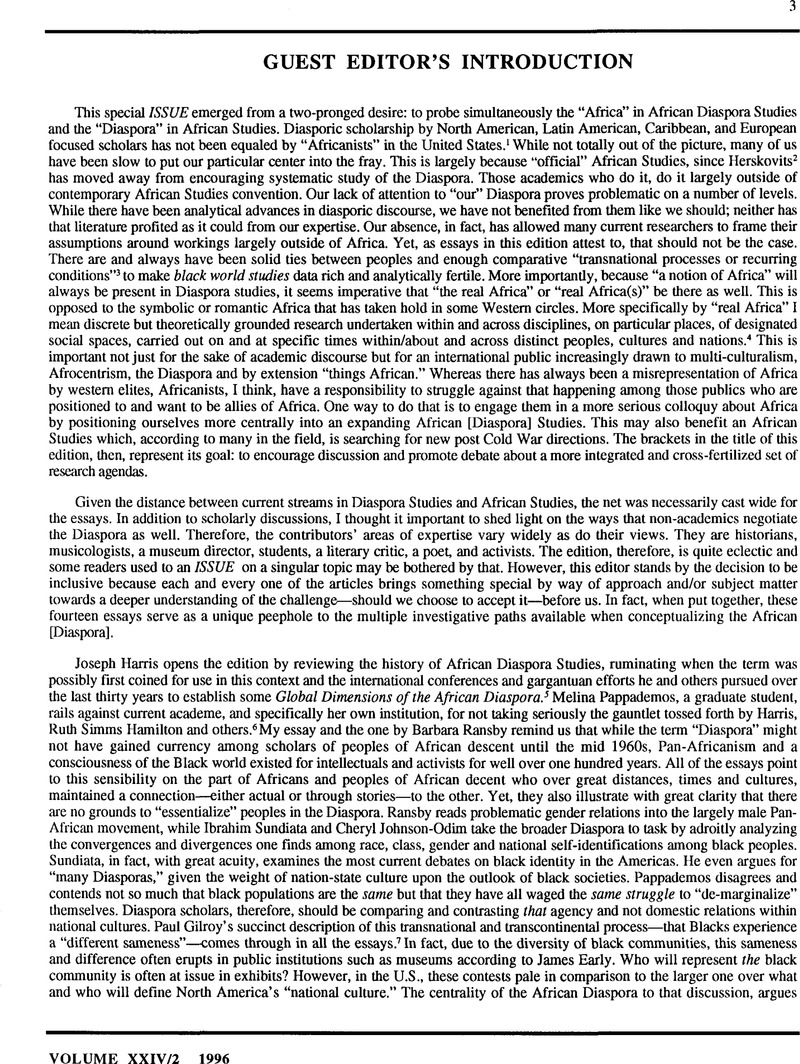No CrossRef data available.
Published online by Cambridge University Press: 13 August 2021

1. For the purposes of this essay, I am using “Africanists” to describe those academics working in universities and colleges in the United States who self-define themselves as specialists of continental Africa. There have been a number of Africanists working in Africa who have researched issues in the Diaspora. For a good review of what some of these scholars were doing in the late seventies and early 1980s, see African Studies Institute, Selected Papers of the Second African Diaspora Studies Conference, Nairobi, Kenya, August 24-26, 1981. Papers included in this text range from Adele Jindi’s “A framework for the comparative analysis of Black Politics,” to J.N.K. Mugambi’s “The Role of Religion in the Struggle for Civil Rights with Reference to Africa and the Black Diaspora.” Also Micere Mugo and Kimani Gecau’s 1979 work “Status Report on Teaching and Research about Afro-Americans in the Department of Literature at the University of Nairobi” is continued in this collection. Another important work was published in 1986 by Seun Ige who challenges conventional comparative literature methods in the transcultural study of African and Diaspora literatures. In Comparative Literature as a Distinct Discipline: A Superfluidity, Ife Monographs on Literature and Criticism, 4th Series, 1986, Department of Literature, University of Ife, Ige argues that the comparative mode has often been used to argue against and ignore common cultural threads in black literature when in fact there are many. An interesting call for more integration of Africa and African Diaspora Studies can also be found in Horace Campbell’s The Challenge of Africa in the Diaspora, Lecture delivered at the Northwestern University Library, Evanston: Council for African American History Month, February 14, 1990.
2. Melville Herskovits wrote on both Africa and the African Diaspora. His interest in the Diaspora is probably reflective of the transitional period in which he worked. In the United States, the period between the latter nineteenth century and World War II was dominated by African American intellectuals such as W.E.B. Dubois, Arturo Schomburg, Carter G. Woodson and others who situated the study of Africa within a Pan African/African Diasporic framework. Official African Studies began around 1948 when predominantly white institutions of higher learning established Programs of African Studies. These Programs, by and large, came to view research on Africa as separate from the study of Blacks in the Americas. Herskovits knew many of the early scholars but also served as a major figure in the establishment of the Program of African Studies at Northwestern University.
3. George Fredrickson’s description of what social scientists do when undertaking comparative history/studies. Fredrickson, , “From Exceptionalism to Variability: Recent Developments in Cross-National Comparative History,” The Journal of American History, September 1995, pp. 587–601 CrossRefGoogle Scholar.
4. I write “within/about and across” disciplines and peoples to allow for new Diaspora-driven systems to be exposed and therefore studied. Because we have not been trained to think crossnationally and to a certain extent in an interdisciplinary way, many important aspects of a “Black World” have gone undertheorized and underresearched. For instance, new conceptualizations of a “Black Atlantic” reveals the lack of attention to transnational research. Paul Gilroy argues that “the concern with the Atlantic as a cultural and political system [in fact] has been forced on black historiography and intellectual history by the economic and historical matrix in which plantation slavery...was one special moment.” Gilroy, , The Black Atlantic: Modernity and Double Consciousness, Cambridge: Harvard University Press, 1993, p. 15 Google Scholar.
5. This is the title of Harris’ book in which he brought together essays from two major African Diaspora conferences. Harris, Joseph, Global Dimensions of the African Diaspora, Washington D.C., Howard University Press, 1988 Google Scholar.
6. Ruth Simms Hamilton has been the primary director and coordinator of the Michigan State University African Diaspora Research Project. In 1988, she brought scholars from around the world to work on the development of some theoretical parameters for the study of the African Diaspora. The proceedings of that conference can be found in Creating a paradigm and research agenda for comparative studies of the worldwide dispersion of African peoples: proceedings of the International Advisory Committee of the African Diaspora Research Project, November 9-11, 1988, East Lansing, Michigan State University, 1990.
7. See Gilroy, Paul, The Black Atlantic: Modernity and Double Consciousness, Harvard University Press, 1993 Google Scholar.